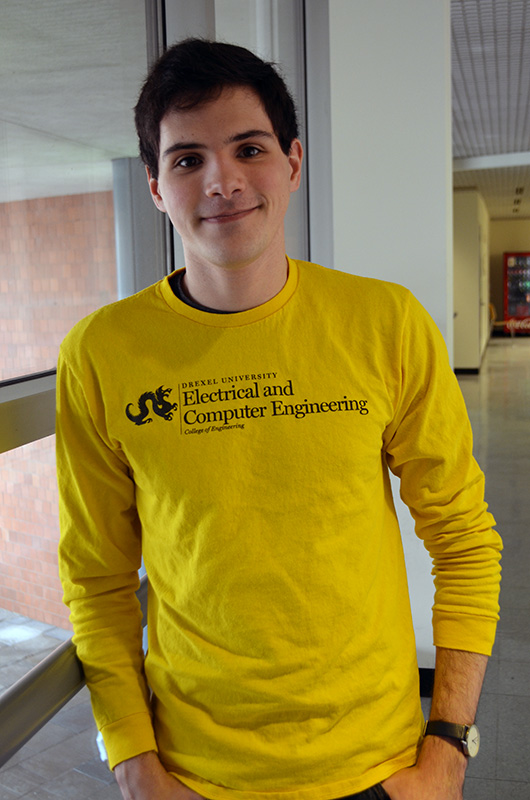
Hunter Kippen
Drexel University is known throughout the world for its cooperative program, which celebrates its 100th Anniversary this year. Here at the College of Engineering, 99% of students fulfill at least one co-op during their undergraduate career. But what exactly does a co-op do all day? This column focuses on one student’s experiences for an hour-by-hour deconstruction of the workday.
This month, we introduce senior Hunter Kippen, who is pursuing his engineering degree in the Department of Electrical and Computer Engineering (ECE).
Name:Hunter Kippen
Class: BS/MS ’19; master’s degree in cybersecurity
Co-op: OSIsoft Software Company, Philadelphia, PA
Work Performed:Member of the cloud services team working on internal tooling/document storage platforms
When: Spring/Summer 2018
| 7:30 a.m. |
Wake up; take time to read the morning news and have breakfast. From an apartment in Philadelphia, there is a 10-15 minute commute by subway to the OSIsoft offices on 17th Street.
|
| 9 a.m. |
Greet co-workers and other co-ops; get coffee from the work machine, put lunch in the fridge; check emails; figure out what needs to be done that day based on emails; take notes. |
| 9:45 a.m. |
“Daily Standup” meeting begins, during which team members report on work from yesterday, work for today, hours needed for particular tasks, and “what’s in your way” to accomplish additional tasks. Work is divided into three-week segments so it can be planned out and slotted into daily schedules. “My manager was a treasure trove of organizational tips. He really helped me figure out how to keep myself organized, and I was always able to stay on top of everything. For example, he always told us to schedule more time than you think you need because something may go wrong; if nothing goes wrong, then you’re fine.” |
| 10 a.m. |
Draw up a general plan-of-attack for, say, a large coding project that takes into consideration earlier work and documents already prepared. “When I was working on enabling the user to export their stored documents, I needed to obtain the documents in the format that they were stored in and transform them into a format where -- once the document was downloaded -- it could be read in by an import function written by a co-worker. Everything has to work together, so you need to be able to plan how you’re going to do that while not losing sight of the standards you need to adhere to.” Work on this until lunch; try to get to a good spot to restart in the afternoon. |
| 12 Noon |
All employees receive $4.50/day for cafeteria food; have lunch or buy snacks to store in desk. “By the end of my co-op, I had like 10 protein bars in my drawer.” Often, co-workers play board games like during lunch, which is a good way to relax while not completely disengaging from work. |
| 1 p.m. |
Back to the desk; check emails, respond to emails. Continue work where left off; spend next two to three hours programming. “There’s not too much collaboration when you’re working. The code you’re assigned to write is solely your responsibility. I’d ask my teammates for help if I needed it, but mostly it’s a solo endeavor.” |
| 4 p.m. |
Go back over for notes and work from the day; write extra test code; fix problems that come up. |
| 5:30 pm. |
Leave work by 6 p.m. at the latest (there were restrictions on how long co-ops could work.) Walk home, “because after sitting most of the day I wanted to be able to stretch. I got to enjoy the river as I walked by, and it was nice.”
|
Takeaway Message: “Working was a lot different than just going to school. There are similar types of requirements. You have deadlines and you have assignments. But they’re very much hard-and-fast; you can’t not make a deadline. You can’t be late. People are depending on your work and that reality didn’t really set in for me until this co-op. At my previous co-ops, my work was more independent and I had a longer-term timeline, but sometimes there was a piece of code I was working on that I needed to finish that they needed the NEXT day. So having those kinds of deadlines was a little bit more interesting.
“Also, doing software development in a professional setting is way different than writing code for a class – the professor will give you a small scenario or a project, so it’s like you’ll only be able to write so much, a subset of a problem. But in the business world, this software has been continually written for the past 15-20 years. So when you enter, you’re just plopped right in the middle. You don’t get to see the big picture, and not many people in the company know where everything is. You can only ask about the parts. I felt like it was less pressure, honestly, in a lot of ways, because you’re not really being judged on your absolute correctness. They want to make sure your stuff works and you wrote good, automated tests that show that it works. That’s the job.
“I found my co-ops useful. Not as useful as they could have been because of course I didn’t follow my own advice here. I still found them eminently useful, however. Having actual professional work experience has been a godsend for me, because it’s helped me figure out the professional world and what kind of job I want in the future. It’s also helped me a lot with my communication skills; how to write emails; how to respond; there’s a way you have to say things and you have to get to the point. You can’t just spend five or six sentences rambling. So that was super useful. So now, as an engineer, I have good communication skills. Having extra experience can help you with that.”